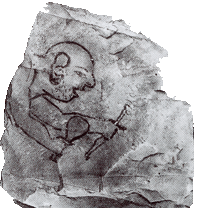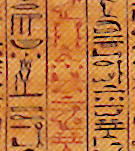|
Walls |
Hieroglyphs were carved in stone or plaster with copper chisels, hit with mallets. They were then painted with brushes using six main colours (see later). This is a stone flake with a drawing of a workman chiselling. A mallet is shown next to it. |
|
|
| Papyrus | Scribes wrote on papyrus
using the stem of a plant called a rush
(click to see a picture), a grass which grows in marshy
areas.
The stem was round and contained a spongy material which soaked up the ink. The end of the pen was cut off at an angle to make a sort of nib (see right). |
||
| Pen Cases |
The reed pens were kept in cases, which usually had round holes with ink cakes, one red and one black. Black was used for normal writing and red for chapter headings, or corrections, just like today!
The scribe also needed a pot of water to mix with the ink cake. The rush pen, paint palette, and water pot, make up the hieroglyph for scribe and for writing:
|
||
| Colours | Six main colours were used in
painting hieroglyphs:
Black - made from soot, coal, or charcoal White - made from gypsum Blue - made from heating a mix of copper salts, calcium and sand Yellow - made from yellow ochre Red - made from red ochre Green - made from copper wollastonite |

a paint palette |
|



